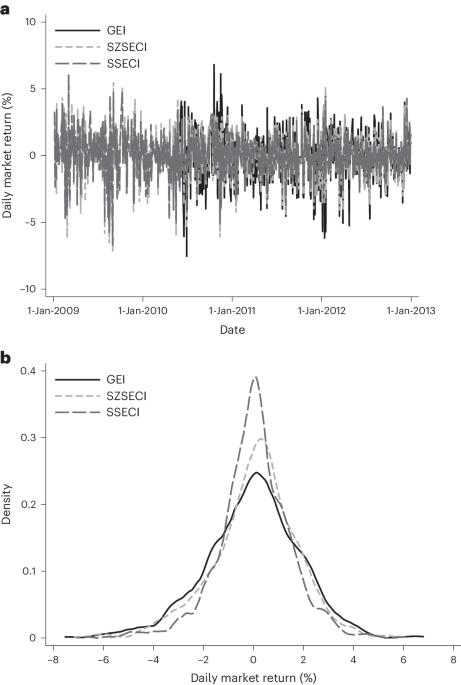Associations between stock market fluctuations and stress-related emergency room visits in China
引用次数: 0
Abstract
Here we study the relationship between stock market fluctuations and emergency room visits in China. Using daily emergency room visit records from the three largest hospitals in Beijing from 1 January 2009 to 31 December 2012, we find that a one percentage point decrease in daily market returns (Growth Enterprises Index) is associated with 0.185 (P = 0.040, confidence interval (CI) = 0.009 to 0.361, or 0.7%) increased cases of cardiovascular diseases and 0.020 (P = 0.060, CI = 0 to −0.041, or 2.5%) increased cases of mental disorders on that day. Moreover, a one percentage point increase in daily market returns (Growth Enterprises Index) is associated with 0.035 (P = 0.007, CI = 0.010 to 0.059, or 3.3%) increase in cases of alcohol abuse on that day. The health effects are highly nonlinear, instantaneous and more salient for older people and males. By contrast, diseases that are less related to psychological stress (for example, infections and parasitic diseases) are not significantly affected by market fluctuations. A back-of-the-envelope calculation suggests that a ten percentage point decrease in daily market returns is associated with an approximately RMB 35 million increase in national medical expenses related to emergency room services. The authors investigate the association between stock market fluctuations as measured by daily market returns and emergency room visits for mental health disorders and physical illnesses, finding the greatest effects among older people and men.

中国股市波动与压力相关急诊就诊之间的关联
在此,我们研究了中国股市波动与急诊就诊之间的关系。利用 2009 年 1 月 1 日至 2012 年 12 月 31 日北京三大医院的每日急诊就诊记录,我们发现当日市场回报率(创业板指数)每下降一个百分点,心血管疾病就诊人数就会增加 0.185 例(P = 0.040,置信区间 (CI) = 0.009 至 0.361,即 0.7%),精神障碍就诊人数就会增加 0.020 例(P = 0.060,CI = 0 至 -0.041,即 2.5%)。此外,每日市场回报率(创业板指数)每增加一个百分点,当天的酗酒病例就会增加 0.035(P = 0.007,CI = 0.010 至 0.059,或 3.3%)。对健康的影响是高度非线性的、瞬时的,而且对老年人和男性的影响更为明显。相比之下,与心理压力关系不大的疾病(如感染和寄生虫病)受市场波动的影响不大。回溯计算表明,每日市场回报率每下降 10 个百分点,全国与急诊室服务相关的医疗费用就会增加约 3500 万人民币。作者调查了以每日市场回报率衡量的股市波动与精神疾病和身体疾病急诊就诊之间的关联,发现老年人和男性受到的影响最大。
本文章由计算机程序翻译,如有差异,请以英文原文为准。
求助全文
约1分钟内获得全文
求助全文

 求助内容:
求助内容: 应助结果提醒方式:
应助结果提醒方式:


